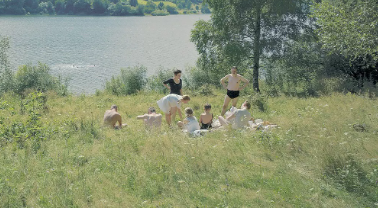Interview: A Human Face: Christian Friedel on The Zone of Interest | Interviews | Roger Ebert


While watching The Zone of Interest many questions are raised. What is the significance of making a movie about the holocaust in 2023? How might it be important to us now? What responsibility to history do we have not only as filmmakers but as human beings?
When making movies about history I believe Filmmakers have a responsibility to the history they are portraying. You have a responsibility to portray history not only accurately but with care. You have to respect the people that were involved and the places that these moments happened. Christian Friedel, who played Commandant Rudolph Hoss in the movie, understands this and speaks about his experience with responsibility. In an interview with Nick Allen of Roger Ebert, Friedel says, “I think the responsibility toward the victims in a way, sometimes Sandra and I, we had the feeling there were ghosts…And sometimes I had nightmares because I was afraid.” While portraying this horrible character, Friedel in turn had this undeniable pain and responsibility to the victims. This compassion made him able to not only depict this character hauntingly accurately, but to also respect the victims that were at the hands of Hoss.
This concept also comes up when talking about the very human portrayal of Hoss and how that connects to today. Friedel says, “For me, the challenge was that he is the commandant, and he is the perpetrator, but to create a different view to seem as a father. I need to connect him with my emotional archive, and that was sometimes hard.” He felt a deep compassion towards these innocent people, and this made it even harder to give off a sense of just a normal fatherly character, knowing the acts that he had done. He felt this moral pushback of portraying a Nazi as a normal human being till he began to understand what the movie asked for. By showing the audience a very normal man, while knowing deep down he is a horrible person, it shows us how ANYONE can be a horrible human being. Friedel notes, “I realized that it could be me. I think this was important, that I realized this could–not that we are all Nazis–but that this could be us.” So why is it important to make a movie about the holocaust in 2023? This is the exact reason. By showing us in modern time how the normal characters in a movie are also some of the worst human beings of all time, we can ask ourselves if anyone currently is this same way. Celebrities, politicians, public figures. Any of these people can easily be the worst human beings in the world. The sense we get from these people can be an exact portrayal we get of the Hoss family, how normal they are, how kind they seem. Jonathan Glazer, the director, not only wanted us to ask questions about this moment in time in World War 2, but to ask questions about now.
This film delves into many different topics of past and present, responsibility to History and how normalcy might be used in film. With this interview I have presented we learn bits and pieces of what went into making this movie and how we can better understand what it is trying to say.